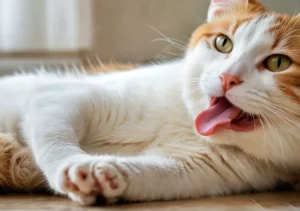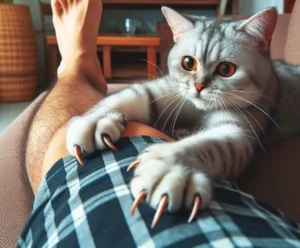Is your cat a furry little ninja, launching surprise attacks in the dead of night? If you find yourself waking up to furry paws battling your hands or feet, you’re not alone. Many cat owners experience this curious nocturnal behavior that leaves them scratching their heads.
Cats may attack at night due to natural instincts, playfulness, or a desire for attention, particularly if they’re deprived of stimulation during the day. But the reasons can be deeper than they seem, and there’s much more to uncover about your feline’s night-time antics!

What drives my cat’s nighttime behavior?
Cats are natural nocturnal hunters. Their instinct to stalk prey often kicks in during the night. This means when the world quiets down, your furry friend is just getting started. Expect lots of energy to manifest through playful pouncing, sudden bursts of speed, or even those surprising little bites.
Moreover, cats are also incredibly territorial creatures. At night, they might feel the urge to defend their territory from imaginary intruders—think of shadows or even your own sleepy movements. This can lead to what might feel like aggression, but it’s really just their instinctual reactions.
And then there’s the scent aspect. Cats have a heightened sense of smell and might be reacting to environmental changes in the night, tracking down scents that pique their interest. All these factors contribute to that nighttime mayhem, so remember, it’s all part of their natural behavior.
Are they bored during the day?
Just like us, cats can get a bit bored. If your cat’s not getting enough stimulation during the day, all that pent-up energy can lead to wild antics at night. A lack of vigorous play or engagement can turn them into nighttime mischief-makers. Consider introducing interactive toys or even puzzle feeders to keep them entertained when you’re busy.
Creating a routine with dedicated play sessions can dramatically alter their nighttime behavior, making bedtime a little more peaceful. Remember to rotate toys regularly—this keeps their interest piqued and prevents boredom.
Also, providing some climbing surfaces or window perches can stimulate their curiosity during the day, offering them the opportunity to observe the outside world, which can tire them out a bit, helping curb those nighttime attacks.
Addressing these daytime needs isn’t just about keeping your cat happy; it can substantially cut down on those unexpected late-night ambushes!
Is my cat’s hunting instinct kicking in?
Cats are natural hunters with instincts that often come alive when the world is quiet, like during the night. Your cat might not see you as just a bedmate but rather as a target in a playful hunting scenario. This behavior can stem from their DNA. The predatory drive is embedded deeply in their nature—these little panthers are wired to stalk, chase, and pounce, even if it’s just on your unsuspecting feet.
The dim light of evening can stimulate that instinct. They might spot shadows or hear noises you wouldn’t notice, triggering their chase response. It’s akin to how they’d act in the wild, where dusk is prime hunting time. This nocturnal behavior can be cute but a bit jarring when you’re trying to catch some Z’s. Keeping them mentally and physically stimulated during the day can reduce this nighttime energy surge. Toys that mimic prey or interactive play sessions can help burn off some of that excess energy.
Could they be hungry or seeking attention?
Cats can be surprisingly vocal and feisty when they’re trying to communicate their needs. If your kitty’s attacking you at night, it might just be saying, “Hey, I’m starving!” or “Come on, give me some love!” Hunger is a straightforward culprit; a cat’s stomach has a way of dictating behavior. Ensure your cat is fed enough during the day and consider feeding smaller meals more frequently to prevent late-night raids.
But it’s not all about food. Cats also crave companionship, and they might turn to playful attacks as a way to engage with you. If you’ve been busy during the day and haven’t spent much quality time with them, they may feel neglected and seek your attention in the most active way possible—by waking you up! Try setting aside some dedicated playtime each evening. A few minutes with a feather wand or laser pointer before bedtime can channel that energy into something more appropriate.
How do different breeds behave at night?
Cats are known for their nocturnal instincts, but their nighttime behavior can vary significantly by breed. Siamese and Oriental Shorthairs, for instance, are often more vocal and active, craving interaction during the night. They might engage in playful antics, seeking your attention as part of their social nature.
On the other hand, Maine Coons and Persians tend to be more laid-back and may not initiate as much nighttime activity, but it’s possible they could still unleash their playful side if they feel energetic. Each breed has its quirks, with some being natural hunters, inclined to pounce and play when the sun sets. So, whether you have a curious Bengal or a sleepy British Shorthair, understanding their breed-specific behaviors can give you a better idea of what to expect after dark.
What environmental factors influence their behavior?
Home environment plays a pivotal role in your cat’s nighttime antics. Noise is a significant factor; if your neighborhood has loud cars or barking dogs, your cat might feel the need to defend their territory. The temperature in your home also matters: warmer environments can energize cats, prompting them to play more at night, while cooler settings might lead to snuggling instead.
Lighting can influence their activity levels, too. Cats are instinctively drawn to movement and light, and if you have night lights or moonlight filtering through your windows, it might trigger their playfulness.
To help mitigate those nighttime surprises, consider the following tips:
- Create a calming environment: Dimming the lights can help signal bedtime to your pet.
- Provide plenty of stimulation during the day: Use toys and interactive play to tire them out.
- Limit nighttime noise: Close windows or use white noise machines to create a quieter, more serene atmosphere.
By tweaking their environment, you can help align your cat’s nocturnal behavior with your sleeping schedule, fostering a more peaceful night for both of you.
How can I redirect this behavior?
Midnight feline ambushes can leave you puzzled and a bit scratched up. To help redirect your cat’s nighttime attacks, start by channeling that energy into playtime before bed. Engaging your cat in interactive play sessions can help tire them out, making them less likely to pounce once you’ve settled in for the night.
Establishing a routine is crucial. Try a consistent evening schedule where playtime, feeding, and quiet time happen at the same hour each night. This creates a sense of predictability that can help calm your cat down as bedtime approaches.
Consider creating a designated play area with toys and scratching posts. Settling down near a comfortable window or on a dog bed can also curb their urge to leap onto your bed for some night-time antics.
If they’re just looking for attention, redirect by investing in puzzle toys or treat-dispensing devices that challenge their minds and keep them occupied. Feeding them a small meal right before bed can also help, as it might encourage them to sleep through the night instead of hunting you down for snacks.
Lastly, if your cat’s attacks become too challenging to manage, consider talking to a vet. They might have insight into anxiety issues or other conditions impacting your kitty’s nighttime behavior.
Interesting facts about cat nighttime behavior
Cats are true creatures of the night. Did you know that they’re actually crepuscular, meaning they’re most active during dawn and dusk? This natural instinct stems from their hunting ancestors, who thrived under the cover of twilight to catch prey more effectively.
Another fascinating tidbit is that over 70% of domestic cats reportedly engage in some level of nocturnal activity, often leading to mischievous behavior when their humans are asleep. Research shows that cats have amazing night vision, allowing them to see in light levels six times lower than what a human needs.
Moreover, it’s believed that a cat’s innate drive to hunt, combined with their social nature, often leads them to seek interaction with their owners during odd hours. Your cat might see you as a friendly target for play or simply want companionship in their late-night adventures.
Finally, consider this: some studies suggest that a cat’s nocturnal activity can also be linked to boredom or lack of stimulation during the day. If they’re feeling energetic at night, it might just be a signal that they need more engagement or mental enrichment in their daily routine.
Could health issues be at play?
Behavior changes can often signal underlying health issues in cats. If your feline friend’s nighttime aggression kicks up a notch, it might be worth considering whether something physical is impacting their mood.
Conditions such as hyperthyroidism or arthritis can lead to restlessness or irritability. For instance, hyperthyroidism speeds up metabolism and can cause increased energy levels, which may manifest as nighttime antics. On the other hand, if your cat suffers from arthritis, they might feel discomfort during the day, making them more agitated at night.
Also, dental problems can contribute to aggressive behavior. Cats in pain will act out, especially during the hours when they seek comfort but find discomfort instead.
Look for signs like changes in appetite, litter box habits, or vocalization. These can provide clues about potential health dilemmas. If your cat seems more active or aggressive than usual, a visit to the vet isn’t just a good idea—it’s essential. Regular check-ups can help catch issues early, ensuring your nighttime experiences are less about dodging swipes and more about cuddles.
Alex, a passionate animal lover, has experience in training and understanding animal behavior. As a proud pet parent to two dogs and three cats, he founded AnimalReport.net to share insights from animal experts and expand his knowledge of the animal kingdom.




